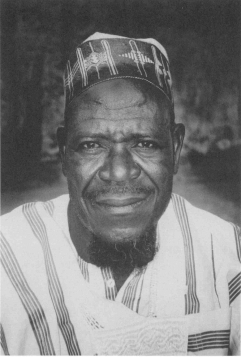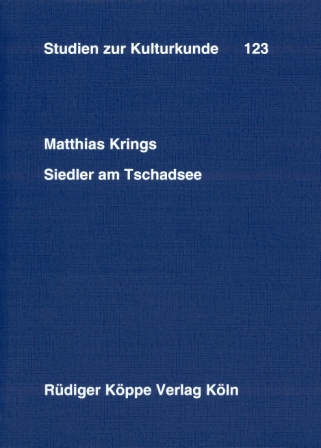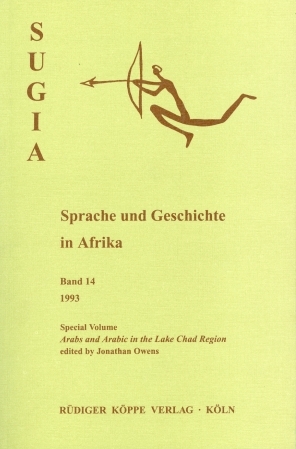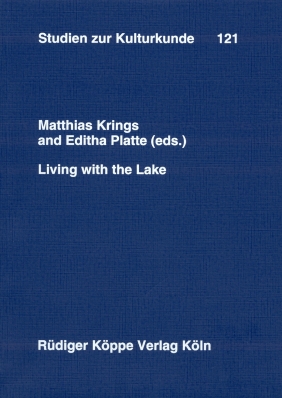



Siedler am Tschadsee
Hausa-Migranten und die Aneignung lokaler Ressourcen im ländlichen Nigeria
Author: Matthias Krings. Series edited by: Holger Jebens, Karl-Heinz Kohl, Editha Platte †.
Series: SzK Studien zur Kulturkunde Volume 123
2004293 pp.
4 maps, 8 b/w photos, 3 kinship diagrams, 9 tables, 7 illustrations, glossary
Text language(s): German
Format: 170 x 240 mm
570 g
Paperback
€ 59.80
Buy 'Siedler am Tschadsee' as a downloadable PDF document directly from our online shop »
Order 'Siedler am Tschadsee' as print edition »
When Lake Chad began to shrink as a consequence of the Sahel droughts in the 1970s, mobile Hausa fishermen were pioneers in converting fertile areas freed from water into arable land and settlement area. This new land represented a kind of social and political vacuum which did not exist anymore in the Africa of that time. More than thirty years after these foundings there exist complex social and economic nets – like in most of the Hausa settlements found in a wide area from Western Africa to Northeastern Africa –, which connect the hereditary Hausa land with the diaspora. Market oriented farm work and commercial fishing constitute the economic basis.
The present study analyzes the means with which the Hausa were able to establish themselves and which were the social and economic principles of their success as settlers. Special focus lies on the economic basis of the migrants that depends on the access to the resources of land and water which are constantly becoming scarcer, on the one hand, and on the social basis, the reproduction and therefore the surviving strategies of the communitiy of the settlers, on the other.
The history of migration research in Africa in the first place offers insights about the forms of new communities and their construction principles in the urban migration centres and therefore about the situation of wage earners. But the main focus of this work lies on the settlers who have access to arable areas and fishing grounds and who work as independent businessmen and who aim at surplus production to be able to participate in local and supraregional markets.
In the first chapter the author introduces Igor Kopytoff’s frontier process as an ideal model of community establishment in frontier places of ancient Africa. He also describes the concept of the Hausa diaspora and examines the transferability to the settlement phenomenon of Lake Chad. Instead of a diaspora theory, in the second chapter the reader finds a catalogue of the main features of these communities followed by the thesis about a diaspora technique. This technique helps the settlers to stand their ground as a distinct communitiy among surrounding foreign societies and to develop economical activities.
The third chapter considers natural, social, and political frame conditions of the colonization of the natural space Lake Chad. The social settlement structures as well as the economic and political strategies of the Hausa settlers are described in the following two chapters, taking an example on the Koloram settlement. The last chapter represents the arguments of the actors who state their rights on the resources and concludes the study with a question about future perspectives of the migrants.
Under these links you will find further studies of languages, cultures and the history of the Lake Chad region, as well as on migration, settlement history and ecology in West Africa:
Accompanying material:
- Arabs and Arabic in the Lake Chad Region
(ISBN 978-3-927620-23-0 ) - Dialoge, Prosa und Liedtexte aus dem Lehrbuch der Hausa-Sprache (Audio-CD)
(ISBN 978-3-89645-007-4 ) - Die materielle Kultur der Konkomba, Kabyè und Lamba in Nord-Togo
(ISBN 978-3-89645-101-9 ) - Environmental and Cultural Dynamics
in the West African Savanna
(ISBN 978-3-89645-478-2 ) - From Bulamari to Yerwa to Metropolitan Maiduguri
(ISBN 978-3-89645-460-7 ) - From Oral Literature to Video
(ISBN 978-3-89645-579-6 ) - From the Tana River to Lake Chad – Research in African Oratures and Literatures
(ISBN 978-3-89645-836-0 ) - Hausa and the Chadic Language Family
(ISBN 978-3-927620-36-0 ) - Hausa Comparative Dictionary
(ISBN 978-3-927620-53-7 ) - Lehrbuch der Hausa-Sprache
(ISBN 978-3-89645-006-7 ) - Lehrbuch der Hausa-Sprache mit Audio-CD
(ISBN 978-3-89645-008-1 ) - Living with the Lake
(ISBN 978-3-89645-216-0 )
Cross-reference:
- Arbeit, Sklaverei und Erinnerung
(ISBN 978-3-89645-349-5 ) - Bole Language and Documentation Unit, BOLDU Report I & II
(ISBN 978-3-89645-475-1 ) - Heimkehr aus Babylon
(ISBN 978-3-89645-913-8 ) - Institutioneller Wandel und Ressourcenkonflikte
(ISBN 978-3-89645-255-9 ) - Les Fulbe du Boobola
(ISBN 978-3-89645-301-3 ) - Lifeworlds of Young Men beyond Migration and Immobility in Pikine, Senegal
(ISBN 978-3-89645-914-5 ) - Migration and Conflict
(ISBN 978-3-89645-903-9 ) - Nomades des espaces interstitiels
(ISBN 978-3-89645-252-8 ) - Spaces in Movement
(ISBN 978-3-89645-905-3 ) - Sustainability in Karamoja?
(ISBN 978-3-89645-256-6 ) - The Global Nuer
(ISBN 978-3-89645-908-4 )
| « back | Print version | [top] |
 Books
Books Audio
Audio Biographies
Biographies Series
Series Festschrifts
Festschrifts Journals
Journals